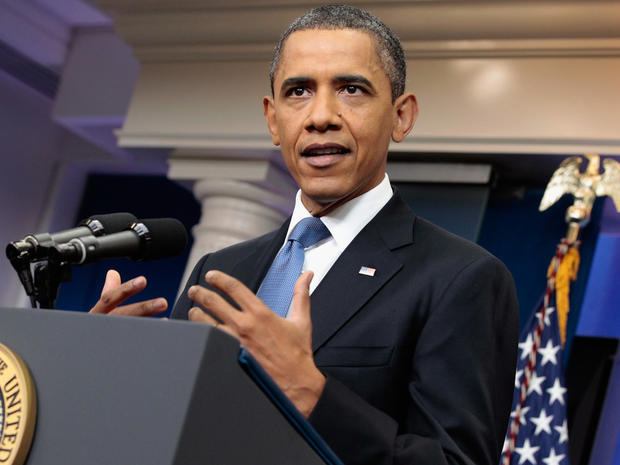Obama's preferred strategy: Go Big
President Obama likes to go big. It's part of the presidential mien. If you are bold enough to run for president then you like to do things in a big way, make your mark in the history books as a bold visionary rather than a plodding caretaker.
In his first two years, Mr. Obama went big, by necessity, on fixing the economy, bailing out banks, insurers and auto companies, and pushing a $787 billion stimulus plan (but not big enough according to some economists). The bailouts kept the U.S. economy from falling off a cliff, and corporate profits are up, but the jobs recovery continues to sputter.
In his most ambitious move to date, he rammed through ground-breaking, comprehensive health care reform that has proven to be highly controversial.
On the war front, the candidate who ran on opposition to the Iraq war, sent 30,000 surge troops to Afghanistan in 2010 at the behest of his military advisers, and now intends to bring them home by in mid-2012 with significant opposition from the Pentagon to his accelerated withdrawal plan.
Showing himself as more of risk-taker than law professor, Mr. Obama decided to send Navy Seals into Pakistan on a secret mission to take out or capture Osama bin Laden. The odds that Osama bin Laden was the mysterious figure seen walking around the compound in Abbottabad, Pakistan were estimated by U.S. intelligence at between 60 and 80 percent.
Now we come to Mr. Obama's latest go big effort, overhauling the finances of the U.S. with unprecedented cost cutting and raising the expiring $14.3 trillion debt limit, which allows the U.S. to use its credit card.
Vice President Joe Biden, who was leading talks with the Republicans to raise the debt limit, proposed $2 trillion package to get the U.S. fiscal house in order. After those talks broke down, the president proposed working toward a massive $4 trillion package, including major reductions in defense, discretionary spending and substantial changes to Medicare, Medicaid and Social Security benefits, as well as some tax increases, as part of a shared sacrifice that he said Congress must endure.
The debt limit fight: a primer
During a press conference on Monday, Mr. Obama talked about how he views the debt limit negotiations as an opportunity to go big, and "do something smart" in overhauling entitlement programs, including raising the eligibility age for Medicare, as part of a deficit reduction plan.
"With respect to Social Security... making changes to these programs is so difficult that this may be an opportunity for us to go ahead and do something smart that strengthens Social Security and gives not just this generation but future generations the opportunity to say this thing is going to be in there for the long haul.
"Now, that may not be possible and you're absolutely right that, as I said, Social Security is not the primary driver of our long-term deficits and debt. On the other hand, we do want to make sure that Social Security is going to be there for the next generations, and if there is a reasonable deal to be had on it, it is one that I'm willing to pursue."
Another pillar of Mr. Obama's $4 trillion plan is some changes to the tax code and reducing tax benefits that go to wealthy Americans, like himself, and corporations, and not "balancing the budget on the backs of middle-class families and working-class families, and we weren't letting hedge fund managers or authors of best-selling books off the hook."
"Nobody has talked about increases --increasing taxes next year. What we have talked about is that starting in 2013, that we have gotten rid of some of these egregious loopholes that are benefiting corporate jet owners or oil companies at a time where they're making billions of dollars of profits," he said during the Monday press conference.
"What we have said is as part of a broader package we should have revenues, and the best place to get those revenues are from folks like me who have been extraordinarily fortunate, and that millionaires and billionaires can afford to pay a little bit more -- going back to the Bush tax rates," he added.
The Republican response to Mr. Obama's plan and efforts to include revenues in the package has been consistent: "After years of discussions and months of negotiations, I have little question that as long as this president is in the Oval Office, a real solution is probably unattainable," said Senate Republican Leader Mitch McConnell said in remarks on the Senate floor.
McConnell then proposed his own back-up plan, giving the president authority to raise the debt limit without any Republican support.
In part, Mr. Obama likes to go big because he can't help but focus on systemic change. It's a characteristic from his academic training and personality, and of first-term presidents, who come in with optimism that they can be a force for change in the way Washington works.
But after a few years in office as the commander-in-chief, Mr. Obama has a better understanding of going big in a political context. It forces the opposition, both within his party and externally, to deal with the specter of a plan that seeks to cure a broad set of interconnected problems and rather than apply band-aids for political expediency. The hope is that a compromise exists that can make everyone feel like a winner, at least for a brief moment.
